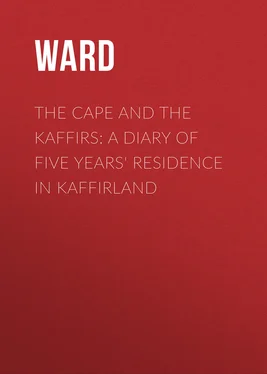Ward - The Cape and the Kaffirs - A Diary of Five Years' Residence in Kaffirland
Здесь есть возможность читать онлайн «Ward - The Cape and the Kaffirs - A Diary of Five Years' Residence in Kaffirland» — ознакомительный отрывок электронной книги совершенно бесплатно, а после прочтения отрывка купить полную версию. В некоторых случаях можно слушать аудио, скачать через торрент в формате fb2 и присутствует краткое содержание. Издательство: Иностранный паблик, Жанр: foreign_prose, История, foreign_edu, foreign_antique, на английском языке. Описание произведения, (предисловие) а так же отзывы посетителей доступны на портале библиотеки ЛибКат.
- Название:The Cape and the Kaffirs: A Diary of Five Years' Residence in Kaffirland
- Автор:
- Издательство:Иностранный паблик
- Жанр:
- Год:неизвестен
- ISBN:нет данных
- Рейтинг книги:4 / 5. Голосов: 1
-
Избранное:Добавить в избранное
- Отзывы:
-
Ваша оценка:
- 80
- 1
- 2
- 3
- 4
- 5
The Cape and the Kaffirs: A Diary of Five Years' Residence in Kaffirland: краткое содержание, описание и аннотация
Предлагаем к чтению аннотацию, описание, краткое содержание или предисловие (зависит от того, что написал сам автор книги «The Cape and the Kaffirs: A Diary of Five Years' Residence in Kaffirland»). Если вы не нашли необходимую информацию о книге — напишите в комментариях, мы постараемся отыскать её.
The Cape and the Kaffirs: A Diary of Five Years' Residence in Kaffirland — читать онлайн ознакомительный отрывок
Ниже представлен текст книги, разбитый по страницам. Система сохранения места последней прочитанной страницы, позволяет с удобством читать онлайн бесплатно книгу «The Cape and the Kaffirs: A Diary of Five Years' Residence in Kaffirland», без необходимости каждый раз заново искать на чём Вы остановились. Поставьте закладку, и сможете в любой момент перейти на страницу, на которой закончили чтение.
Интервал:
Закладка:
“You tell us,” said he, in the measured and gentle tone peculiar to his language, “that all the world is wicked—dreadfully wicked; that man is condemned to punishment, except he be redeemed by faith. You tell us that every one is wrong, and God alone is right?”
“Certainly,” replied the missionary; “except we believe in and obey God, we cannot be saved.”
“And you are sure,” continued the Kaffir, “that man is very wicked, and God alone is good?”
“Quite sure,” replied the missionary.
“And there have been thousands—millions of men, and many, many countries far away and beyond the waters,” pursued the savage, “full of sin, who cannot be saved, except they love and fear God, and believe in him and in all these mysteries which none of us can understand, and which you yourself even cannot explain?”
“It is but too true,” said the missionary.
“And there is but one God?” pursued the Kaffir, in a tone of inquiry.
“But one God,” was the solemn answer.
The savage pondered some minutes, and then observed, “What proof have you that God is right, and men are wrong? Has no one ever doubted that One being wise and the other being weak and sinful? How strange that the word of your One God should be allowed to weigh against the will and inclination of the whole world! Your cause is hardly a good one, when hundreds and millions are opposed in deed and opinion to one! I must consider your arguments on Christianity well before I decide on adopting your creed.”
Another remark of one of these natural logicians equally illustrates their determination not to be persuaded to anything without having their own reasons for it. Wherever their inclination leads them, they possess such an art of defending themselves as would be an invaluable addition to the talents of a special pleader in a criminal court. One Kaffir who had become a Christian, at least apparently so (for I doubt the decided conversion of any, except the Chief, Kama)—was striving, for reasons of his own, to bring others to the creed he had adopted. After much argument, one, who grew tired of it, closed it by observing that “since such punishments were in reserve for those who neglected the laws of the Master whom they engaged to serve, he preferred enjoying the world as much as he could while living, rather than becoming a subject of one whose laws were irksome, and whose punishments were so terrible.”
This art of reasoning, however it may lead them into discussions as full of sophistry as ingenuity, may be the means of converting some of them to Christianity. It makes them keen listeners; and, since the Word of God is so plain, that “he who runs may read,” may not these poor people be persuaded to that which must teach them that wisdom and power, and mercy, and unbounded benevolence, are the attributes of that God whom they are invited to worship? Sometimes, I hope this, and then some proof of Kaffir treachery makes me wonder how I can ever form such a hope.
I should say, with Fingoes, Kaffirs and Hottentots, persuasion and quiet reasoning would work the will of God before all the threats relative to that dreadful world where sinners are described as in everlasting torment. This is hardly the place for such discussion, but I cannot help saying, that I think the creed of many who profess to explain the Word of God, a fearful one: instead of holding up our beneficent Creator as a Being worthy to be served for love, they dwell too much on the punishment of sin, rather than on the reward of virtue. It is by some deemed wiser to frighten the ignorant into serving God, than to lead them by gentle means to love Him, to honour and to put their whole trust in Him. What a mistake! I have often pondered on the difference (if I may so express it) of the two sources of religion—the one proceeding from fear of our great spiritual enemy (and which, after all, is a fallacious kind of worship)—and the other from love of the Almighty!
Tell the savage that God is infinitely wise and powerful, and good to those who serve Him, and he will at least listen further; by which means much may be done. Talk to him of a dreadful place of punishment, he will turn his back on you, and refuse to enlist under the banners of those whose chief arguments are based on such threats. Begin with reference to God as merciful, as well as just, and the savage will soon acknowledge the necessity of punishment for evil deeds in an equal degree with rewards for virtue. It is right he should know that eternal suffering awaits the sinner, but, before he is thus threatened, teach him “the beauty of holiness,” and “praise God as one worthy to be praised.”
On my journey into Kaffirland, our road one day lay through a pleasant country, where the grass was green, and the mimosas bright with their golden clusters of flowers. At the spot where we outspanned, a waggon, driven by Fingoes, had halted: it was drawn close up to a bush, and the party in charge of it, consisting of two men, three women, and their children, were seated in the shade. To our surprise, we observed that one man was reading aloud to the party; and, anxious to hear the language, which is peculiarly soft and liquid, we walked up to the group. Our surprise was increased when we found that the book occupying their attention was the Bible, translated into the Kaffir language, which, by the way, scarcely differs from the Fingo. The sight of this dusky group so employed, had a strange effect, and the flowing ease and beauty of the language in which the Word of God was explained to the attentive listeners, increased the interest we felt in the scene. None of them could speak English; but the reader, pointing to the book, uttered the single word “Good” impressively.
It is singular enough that Barrow and other travellers do not allude to the race of Fingoes; this oversight is probably owing to their having been, till of late years, the slaves of the Kaffirs. 6 6 The term “Kaffir,” is by no means recognised by the Kaffirs themselves. It was bestowed on them by the Portuguese. The word is from the Arabic, and signifies “Infidel.”
The following account of them I have gathered from a work compiled by the editor of the “Graham’s Town Journal,” and published in 1836:—
“It appears that the term ‘Fingo’ is not their national appellation, but a reproachful epithet, denoting extreme poverty or misery,—person having no claim to justice, mercy, or even life. They are the remnants of eight powerful nations, which have been destroyed or driven out of their country by the destructive wars carried on amongst the natives of the interior. Five of these nations were destroyed by the cruel Matawana, and the rest by the notorious Zoola Chief, Chaka, or some of the tribes tributary to them. The names of these nations were:
“1. The Amalubi,—signifying a people who tear and pull off.
“2. The Amazizi,—a people who bring. About twenty years ago, they, as a powerful nation, inhabited the country on the north-east of Natal.
“3. The Amabile,—people of mercy.
“4. The Amazabizembi,—axe-vendors.
“5. The Abasaekunene,—right-hand people.
“6. The Amantozakive,—people whose things are their own.
“7. The Amarelidwani,—no definite meaning.
“8. Abashwawo,—revilers or reproachers.
“These nations being broken up and dispersed, many of those who escaped flew westward, and thus came into collision with the Amakosa Kaffirs, but principally with the tribes of the late Hintza, whose death is graphically described by Sir James Alexander, 14th regiment, in his account of the last Kaffir irruption in 1834 and 1835. They became slaves, herds, ‘hewers of wood, and drawers of water,’ as well as tillers of the ground. They were oppressed in every way; when by industry they had gathered together a few head of cattle, they were either forcibly taken away from them, or, being accused of witchcraft, their property was confiscated. In short, their lives and property were held on the same precarious tenure, the mere will of their capricious, cruel and avaricious taskmasters.
Читать дальшеИнтервал:
Закладка:
Похожие книги на «The Cape and the Kaffirs: A Diary of Five Years' Residence in Kaffirland»
Представляем Вашему вниманию похожие книги на «The Cape and the Kaffirs: A Diary of Five Years' Residence in Kaffirland» списком для выбора. Мы отобрали схожую по названию и смыслу литературу в надежде предоставить читателям больше вариантов отыскать новые, интересные, ещё непрочитанные произведения.
Обсуждение, отзывы о книге «The Cape and the Kaffirs: A Diary of Five Years' Residence in Kaffirland» и просто собственные мнения читателей. Оставьте ваши комментарии, напишите, что Вы думаете о произведении, его смысле или главных героях. Укажите что конкретно понравилось, а что нет, и почему Вы так считаете.












